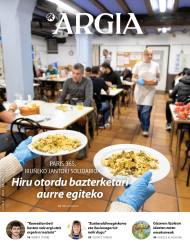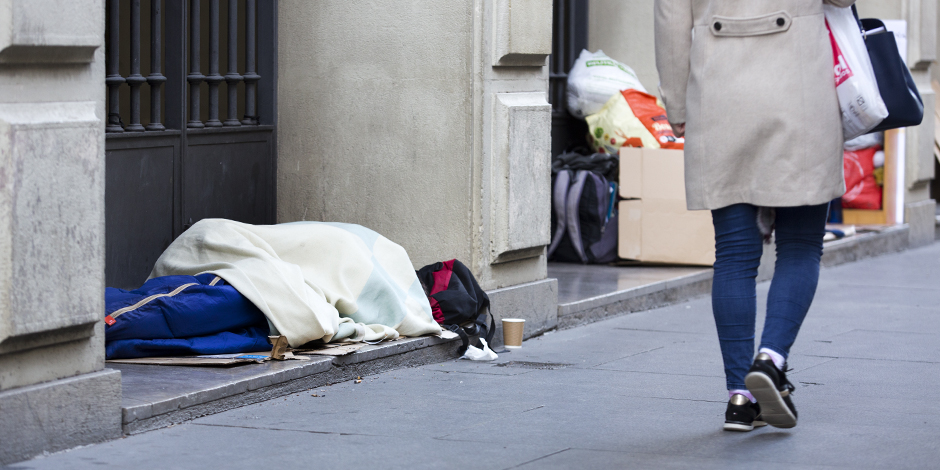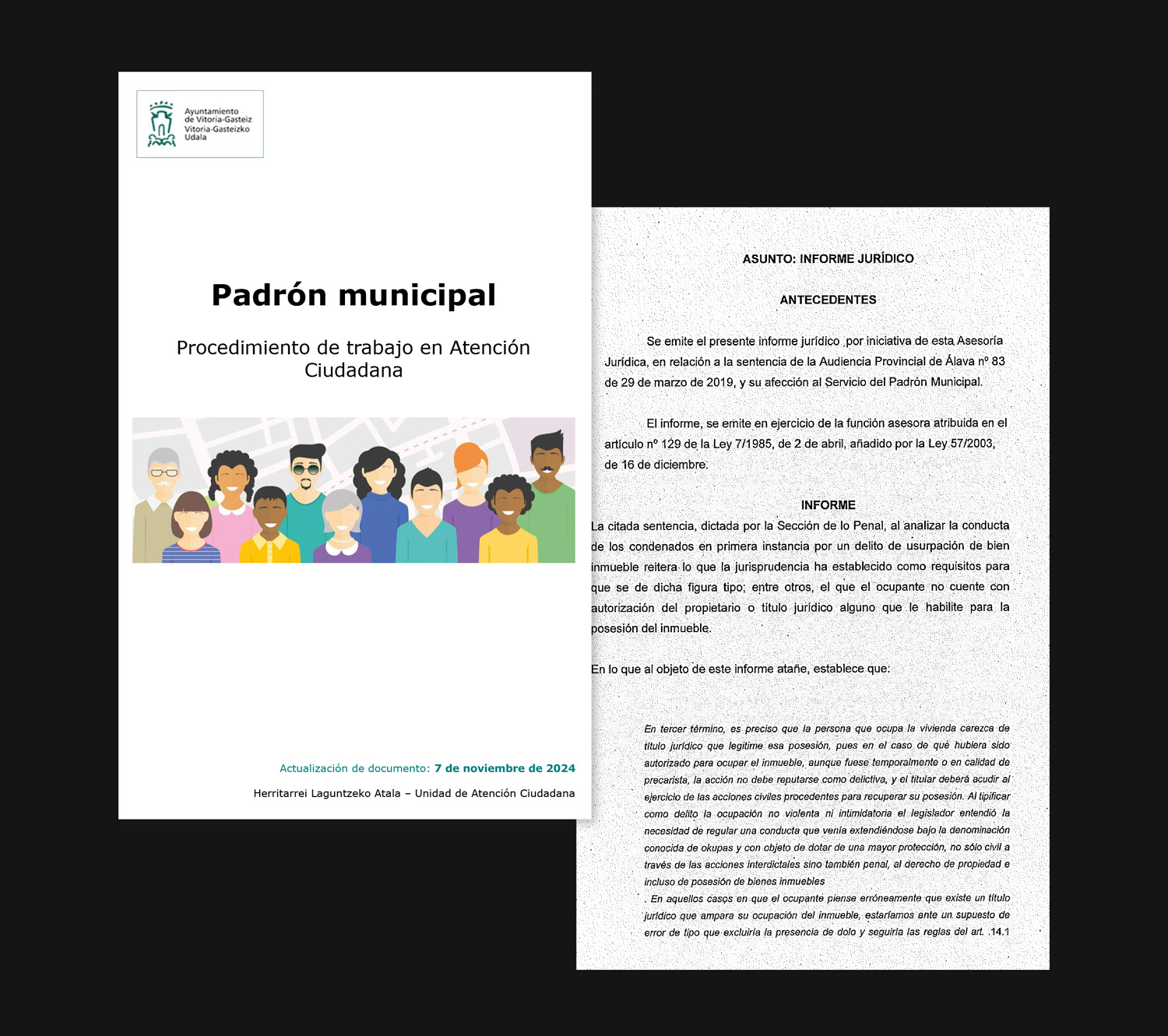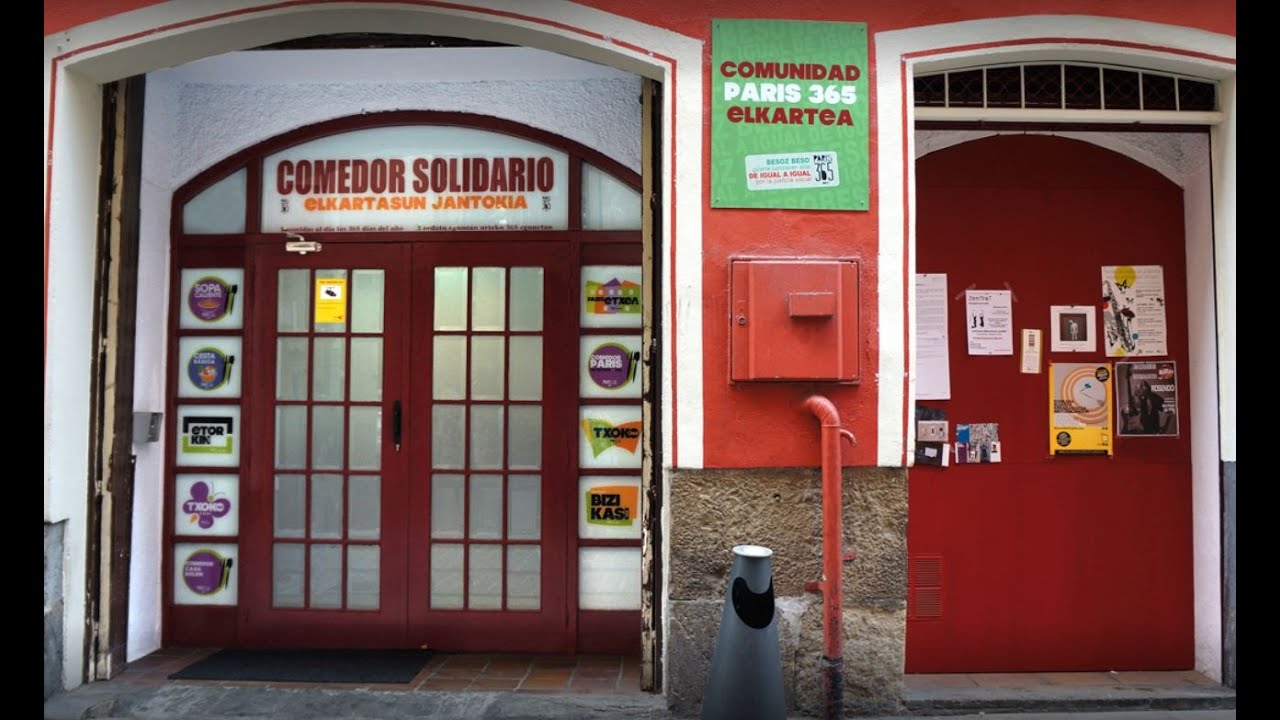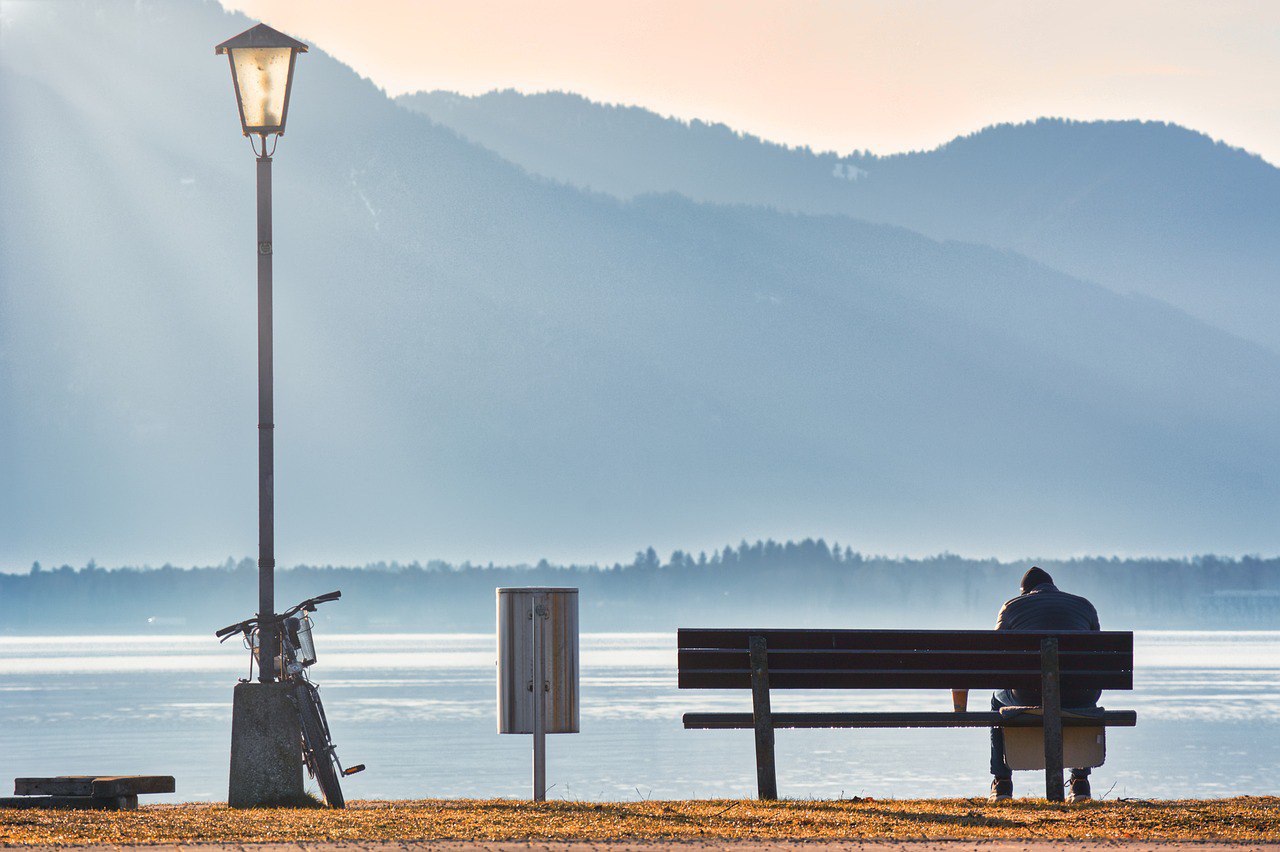A family to keep moving forward
- To meet the food needs of people in situations of exclusion, the solidarity dining room Paris 365 was launched in Pamplona in 2009. Since then, for 1 euro they provide three hot meals a day. On January 27, it was announced that they would stop giving face-to-face dinners because they could not provide adequate attention and there was tension in the street of the dining room. After the internal reflection, from April 7, dinners are offered again. Social worker Maria Argain, former social worker and volunteer Juana Urra, users Wilfredo Hurtado and Toribio Colchado sit around a table and give more details about the measures.

At dawn it’s quiet in the San Lorenzo street of Pamplona, where a red door opens and closes. "Solidarity dining room," says the sign on the door. Next to it, another sign that says "Paris 365 Association". In the corner at the entrance there are some young people. Some are on the computer, others are charging and/or talking to the mobile phone. In the kitchen, you can hear the pots, the blender and others. Further inside, in the dining room, no noise is heard. It's empty, and the chairs are on the table. Argain, Urra, Hurtado and Colchado sit around one of these tables and start talking.
Paris 365 has been working for sixteen years to help people in serious situations of exclusion and raise awareness of the problem. They have a few projects in hand. Among them, the supportive dining room Paris 365. For 1 euro each day, volunteers prepare meals – breakfast, lunch and dinner – for sixty people. At the end of January, they decided to give out tupers instead of face-to-face dinners. Argain explains that a lot of things were accumulated, so that, in addition to the difficulties of serving users as they would like, a lot of people were left out: “On the one hand, we saw that we did not have the resources to attend to all the people who came.”
.jpg)
On the other hand, about 70% of the people who go to the dining room are in a street situation, which means that there is more tension in the street: “Being on the street, lack of resources and a state of helplessness is what causes tension in the street and confrontations between them,” says Argain. Inside the dining room they have not noticed this, but in the streets of San Lorenzo and Descalzos they do. There were also complaints from neighbors. In addition, the police presence in these streets has increased in particular: “It’s my personal opinion, but having a larger police presence is not good. It’s also dissuasive for users.”
Since they didn’t know what to do, they decided instead to offer face-to-face dinners, tuper to the users and distribute them at lunchtime. Once the decision has been made, talk to the users and neighbors, who have visited the Parliament of Navarra. “In general, users have accepted the measures and have collaborated,” says Urra. In addition, Argain says that they have become active subjects of change: “They finally had to take responsibility. They have to bring tupers, clean them... and many live on the street, with all that it implies. It is important that in this change the users have been involved a lot and have been a very active part.”
Hurtado highlights that it has been necessary and appropriate to stop taking preventive measures: “I think we have to take care of the internal order first, then, to order the external. For me Paris is a family, that’s why we have to preserve and protect its prestige.” He adds that before entering the dining room they had to go through the social worker, do an interview and sign a document. Through this, they are committed to respecting and caring for the space, the material and the people: “I think it’s admirable. If we don’t take care of the inside, it won’t be reflected outside.”
In these two months the situation has not changed much, but the tension has relaxed and it has been useful to talk with the Government of Navarre and to raise the problem. Argain, the president of the Human Citizen Foundation, Josean Villanueva, the coordinator and manager, Myriam Gómez-García, and the person in charge of communication, Mikel Urabaien, have visited the Parliament of Navarre at the request of the Committee on Social Rights. “We didn’t just talk about closing dinners, we wanted to make a kind of denunciation to take action in the administration and parliament. In the end, there are many people in a situation of serious exclusion in Pamplona, and more and more people arrive without networks or resources”, explains Argain. According to the AROPE report, which analyzes the situation of poverty in the Spanish State, the population with severe material and social deprivation in Navarre has increased from 7.7% to 9%. This is the highest data since 2015.
.jpg)
Photo by: Dani Blanco / LIGHT CC BY-SA
In addition, they have seen that user processes are being extended and chronicled. “They used to stay for about three or four months, and then they stopped using it because they didn’t need the dining room. They are now at least seven or eight months old. This makes it difficult to intervene,” Argain said. There is a closed list of access to the dining room, which can offer a maximum of sixty places. This means that in the past, in one year, they had the capacity to serve three or four people per position, which has now been reduced to one. In addition, the purpose of the dining room has never been to perpetuate the situation of these people; on the contrary, they want to acquire the resources they need and continue advancing.
Obstacles to the Spanish Foreign Law
The Paris 365 project was born with the outbreak of the 2008 economic crisis. Because a group of citizens saw that as a result of the crisis, many people were in a serious economic situation due to the loss of their jobs. That is why they decided to create the Human Citizen Foundation. The members of the Foundation observed that there were no social canteens in Pamplona. For this reason, in June 2009 it was decided to launch the Paris 365 dining room. In 2012, the City Council of Pamplona created a municipal dining room. “In the beginning, people from Pamplona came especially to the dining room, but in recent years the number of immigrants has increased,” explains Argain. However, in general, people who are in a serious situation of exclusion go to the dining room.
With regard to the rise of immigrants, institutional racism in general exacerbates the problem. According to the report of the Office of Attention and Denunciation of Racism SOS of Navarre, from 2023 to 2024 there has been a 37.75% increase in cases related to exclusion. A total of 208 cases have been dealt with, 76 per cent of which were related to the public administration. The data were announced in March during the presentation of the annual report on racism. Agustín Cuevas of SOS Racism highlighted that “denunciations are the peak of the iceberg” and that there are “many” undenounced cases. In this connection, according to Hurtado, the Spanish Foreign Law has a great influence on the rise: “It is useless to have a profession because we are hindered by the law. We can't find a job. And as you say, working in black means we're going to be exploited and used. This affects the mood and socially a lot.”
The dining room is not the only resource that the foundation has; they have a solidarity store, second-hand shops and a corner. As far as the solidarity warehouse is concerned, its objective is to guarantee a minimum of nutrition. For this purpose, food baskets are prepared for sixty families each week. The distributions are held on Mondays, Wednesdays and Fridays, and each family must choose a day to receive the meals. They have the warehouse at number 11 of the Paseo de Anelier in the district of Arrochal in Pamplona. “Many women and children come to the solidarity warehouse. A lot of one-parent families,” Urra said. In the dining room, there are many more men.
In the case of second-hand shops, they have two, located on Calle San Anton and Gran Vía in Pamplona’s Old Town. The clothes offered there are donations made by individuals and companies. The purpose of the stores is to provide food resources and a source of income for job creation for people who are unemployed and socially vulnerable. Along with that, dining room users can get tickets to buy clothes.
.jpg)
.jpg)
While it is important to
guarantee food and clothing for each other, everyone has stressed that it is also important to create spaces for leisure, socialization and networking. This is the purpose of the corner. The corner is as soon as you enter the dining room. There are computers available for users to use. They watch movies, play trivial, receive Spanish classes and do many other things in it. According to Argain, they used to do more: “He’s a little paralyzed. We use it more with people in practice.”
Hurtado emphasizes that the creation of such spaces has an impact on both the economic and social levels: “Getting together is a big help for many people who are lost.” Hurtado is Peruvian and arrived in Pamplona in 2017. A year later he entered the dining room. Since then he feels that the association is a family. However, it seems to him that over the years there are fewer opportunities to socialize. It highlights how much has changed the way we relate since COVID-19: “Before we did a lot more things, we stayed to talk and play after the meals. When the state of alarm was established everything was sad and there was silence. Paris went ahead and so did we, but it’s not what it used to be.”
Colchado and Hurtado also feel that it is a space to face loneliness. Colchado is also Peruvian and has lived in Pamplona since 2000. She entered the dining room a year ago recommended by a Peruvian friend: “He told me that since I was alone, they would take care of me and take good care of me. It is a good precaution for those of us who do not have a job or are old. They are beautiful people and we are like a family.” While talking about the dining room, Urtado repeatedly extends his hand to Colchado. They've been friends since they met in the dining room. Hurtado points out that Paris 365 has been an emotional support for Colchado because he was alone and marginalized.
Hurtado has also felt lonely for a few moments, but he says there have always been a couple of people helping and guiding him. He stressed the importance of mutual concern: “Sometimes we don’t know what happens to some people, but you can see on their faces that they are wrong. As you approach them, you see that they are angry, angry and frustrated. For what reason? Because they are alone.” That is why he believes that it is necessary to help and encourage each other: “The dining room must be a springboard to achieve your goals.” It is a joy when the young people who have passed through the dining room write to him to tell him where they are and how they are. Before he begins to talk about the dining room, he shows the others the message sent by an ex-user, excited and smiling.
.jpg)
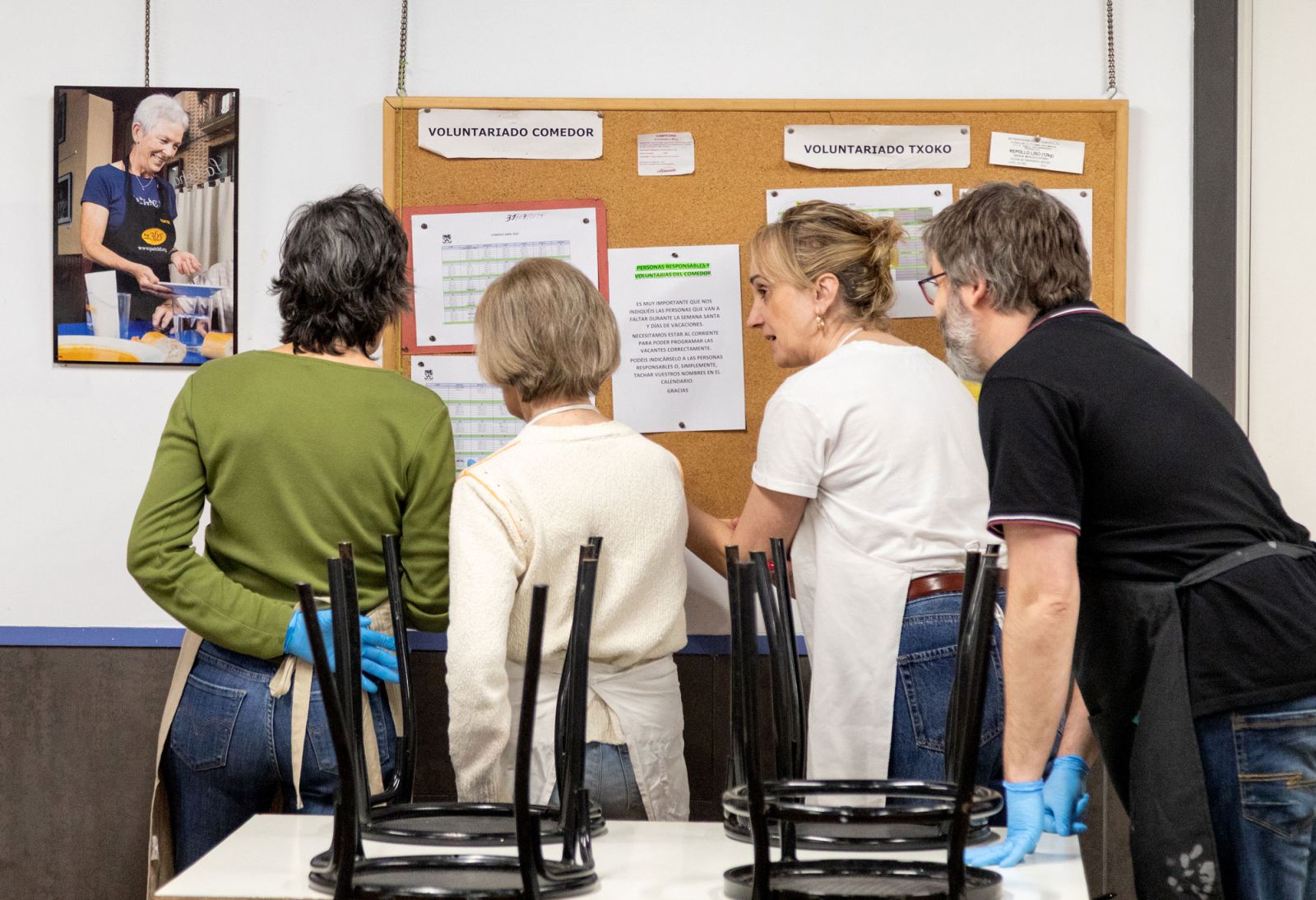
Explaining the final details. The dining room is empty, but it seems that the time for lunch has come and the noise is beginning to be heard at the entrance of the dining room. At the end of the colloquium, a group of volunteers entered and began to prepare tables. Everything must be ready by 1 p.m. They divide the entire week’s rounds among 300 volunteers, some go weekly, and others less frequently. Two of them are in charge of the organization of the rounds. The volunteers who have entered the dining room have started to lower the chairs, put on plates, forks and others and have prepared everything at full speed. When the users arrive, they will have to distribute the food and collect everything.
A door separates the eating area from the corner. Users are starting to accumulate in a queue, it can be seen that 13:00 is about to arrive. They go into the dining room one by one. In the meantime, a group of volunteers in the lobby bar is collecting and preparing tupers. “How are you? What do you want? How are you doing?” they begin to ask in their hands. “Are you okay? “I’m tired,” someone else asked. “You only brought one tuper; what do you prefer? “Someone else said. They fill their tupers, put them in a bag and leave. Meanwhile, the red door number 31 of the San Lorenzo Street opens and closes.
.jpg)
A few weeks ago, on Diputación Street, in the centre of Vitoria-Gasteiz, two men threw a homeless person off the small landing outside the place where he slept. In addition to being thrown away, a metal railing was immediately placed in front of the lonja. Although the place... [+]
Trumpen itzulera pizgarri izan da sendotuz doan eskuin muturreko erreakzionarioen mugimenduarentzat. Izan ere, historikoki, faxismoaren gorakada krisi ekonomikoekin lotuta egon da, baita sistemaren zilegitasun politiko eta ideologikoaren krisiarekin ere. Gaur egun, geldialdi... [+]
The policy of the Basque Government to criminalise the poor has become news again in November. Lanbide has created an anonymous whistleblower for honest citizens to denounce “any suspicion of irregular actions” from potentially fraudulent citizens receiving Income Guarantee... [+]
Pools can be a classroom to understand class conflict, analyzing differences between bodies. I've been swimming in municipal pools for many years. Almost always in the Aldabe Civic Center, located between the neighborhoods of Alde Zaharra and Errota. But there was a time when I... [+]
Iruñerriko Etxebizitza Sindikatu Sozialistak eta Harituk Iruñeko Udalak etxegabeentzat eskaintzen dituen baliabideak kritikatu dituzte: "Ogi apurrak dira", adierazi du Martin Zamarbide Harituko kideak. Behin behineko zenbait "aukera" ematen... [+]









